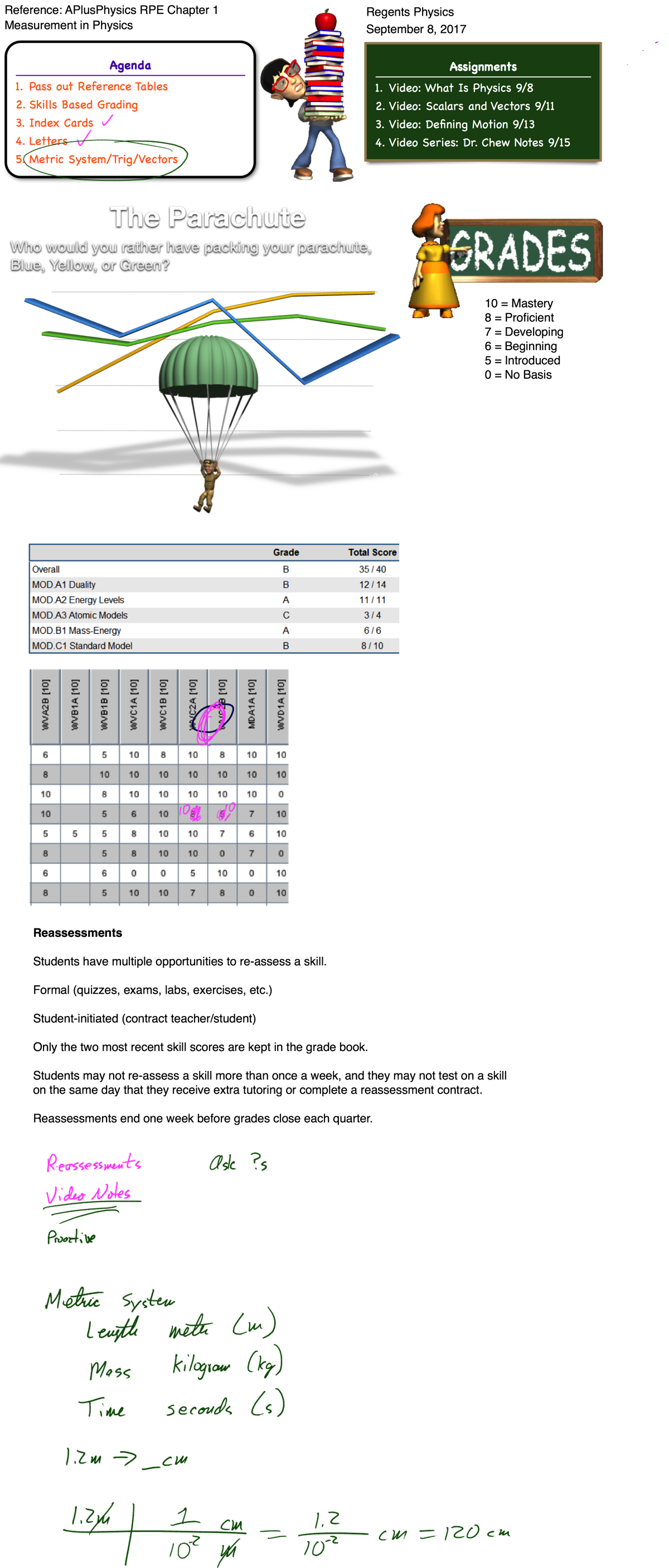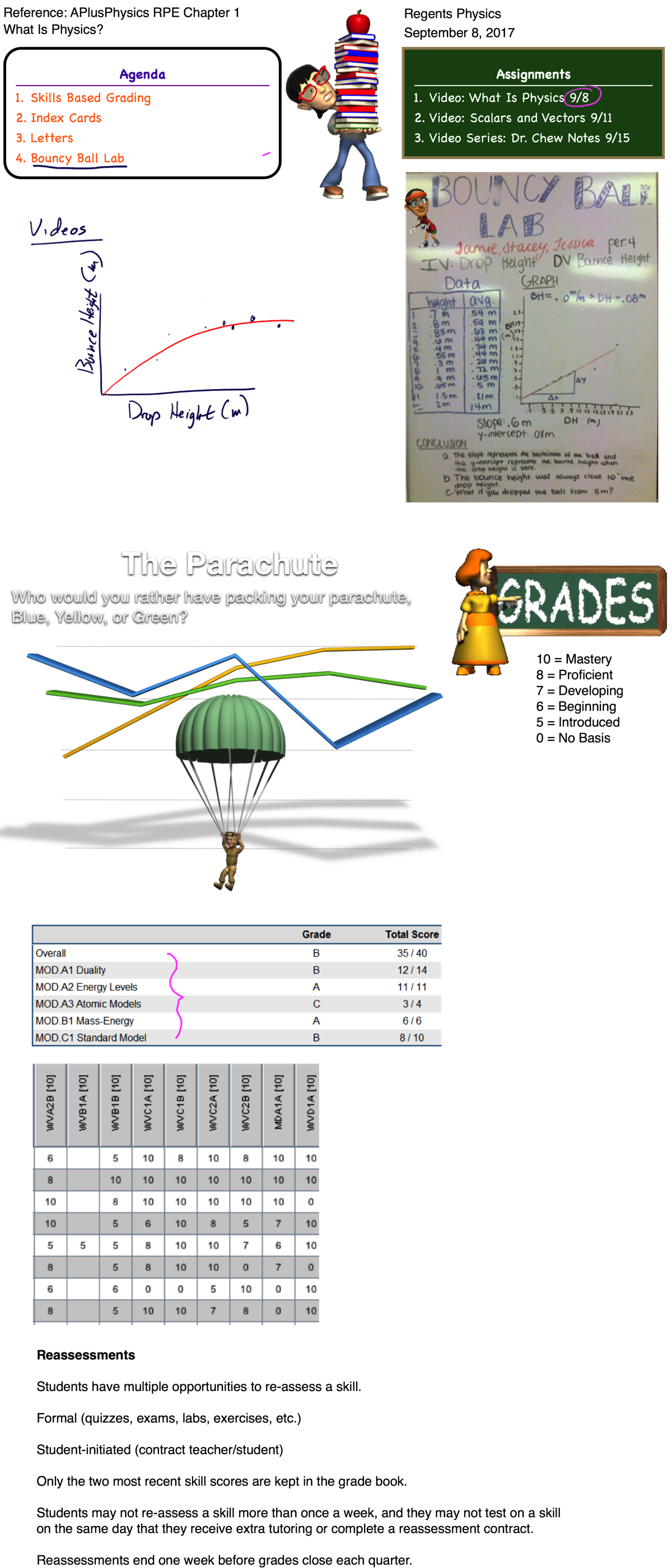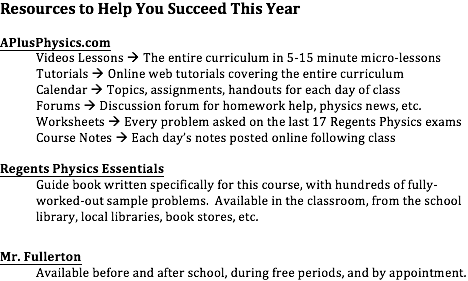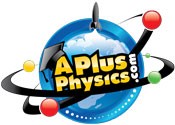
Category Archives: SBG
Bouncy Ball Lab

Intro to Regents Physics

Expectations
My expectations for the year are simple yet far-reaching:
- Come prepared to class each and every day.
- Give me your best effort each and every day.
- Be respectful – to yourself, to your classmates, and to the instructor.
- Conduct yourself in a professional manner.
The following classroom rules should also be observed:
- Giving less than your best at any time will not be tolerated. If you put the effort in, I will MORE than meet you halfway this year. We will embrace a goal of EVERY STUDENT succeeding in physics at the beginning of the year, and we will achieve that goal by the end of the year through effort, dedication, discipline, and teamwork.
- No electronic entertainment devices, non-educational websites, or cell phones are to be used during class time unless authorized as part of the classroom activity and used appropriately. Inappropriate use of technology will result in confiscation of the device and/or loss of computer privileges. If an emergency arises, please seek the instructor’s permission in advance.
- No pants are to be worn below the waist line. A belt will be provided to you should you choose not to comply.
Materials needed for this class:
- Notebook
- Calculator (scientific)
- Binder
- Pen/Pencil
- Enthusiasm and a positive attitude
Homework:

Exam Review / SBG Grading Review
Agenda:
- Exam Review
- SBG Grading Review Video and Discussion
HW:
- Read text pp. 72-75, do problems 42-46 with FSA format.
- Catapults due 10/27
- Watch “Regents Physics: Free Fall” video
Skills Based Grading and Tower of Power
Agenda:
Textbooks
Math Assessment & SBG
Tower of Power
APlusPhysics Review
Homework:
1) Return Expectation Sheets by 9/7
2) APlusPhysics.com
A) Watch "What is Physics" by 9/6
B) Introductory Forum Post/Response by 9/9
Intro to Skills-Based Grading
Welcome to a new way of looking at the classroom – and a new way to learn. We’re going to be doing some things differently in our physics classroom this year. What sorts of things? Everything! Your grade, your homework, your way of learning – you are finally in the driver’s seat!
 During this year, you will be learning information related to many topics in physics. In this course, a non-traditional criterion-based assessment system is used. Rather than using a standard point system to record scores on various assignments, quizzes and tests, you must demonstrate your level of proficiency on various learning goals. For example, instead of getting one grade for a worksheet that may cover many topics, you will be scored on individual learning goals such as, “I can interpret/draw d-t graphs for objects moving at constant velocity.” These learning goals and achievement levels for each will be provided to you.
During this year, you will be learning information related to many topics in physics. In this course, a non-traditional criterion-based assessment system is used. Rather than using a standard point system to record scores on various assignments, quizzes and tests, you must demonstrate your level of proficiency on various learning goals. For example, instead of getting one grade for a worksheet that may cover many topics, you will be scored on individual learning goals such as, “I can interpret/draw d-t graphs for objects moving at constant velocity.” These learning goals and achievement levels for each will be provided to you.
Grades will be assigned based on descriptors of achievement only. Grades will not be affected by issues such as effort, attitude, participation, and attendance. Those factors will be reported separately.
New information showing additional learning will replace old information. Grades will reflect the trend in most recent learning, which means that you will have multiple opportunities* to improve your grade. Maybe you forgot about a test, or were having a bad day. In this class you have the ability to go back and relearn the things you didn’t know, and improve your skill level on topics in need of improvement. This also means, however, that cramming information into short-term memory will not benefit you in the long run, as skill grades can also decline if mastery is not maintained. I don’t want grades to be a stick, and I don’t want you to be scared of them. I want grades to be a carrot, a motivator, and I want them to mean something. I want them to be a communication device that tells us both where you’re strong, and where you need to focus your efforts.
The key to success in this course is consistency in study habits both inside and outside the classroom. To assist in this manner, in many portions of the course, homework will focus on mini-lessons to learn new material, while class time will focus on hands-on activities and problem solving (a “flipped” model compared to most classrooms where materials introduced in the class, and practice occurs at home).
You may re-attempt assessments provided that you have documented an effort to engage in additional learning (e.g., tutoring, additional practice, test corrections, etc.) In addition, an alternative assessment may be accepted if the work is pre-contracted between you (the student) and me (the teacher). Deadline for reassessments within a quarter will be one week prior to closing of quarter grades.
For each skill and learning goal in each unit of study, you will be scored using the following scale out of 10 possible points:
10 = Mastery. Indicators include:
- I understand the content/skills completely and can explain them in detail.
- I have explained and taught the skills to another student.
- I have high confidence on how to do the skills.
- I can have a conversation about the skills.
- I can independently demonstrate extensions of my knowledge.
- I can create analogies and/or find connections between different areas within the sciences or between science and other areas of study.
- My responses demonstrate in-depth understanding of main ideas and of related details.
9 = Advanced. Indicators include:
- I understand the content/skills completely and can explain them in detail.
- I have high confidence on how to do the skills.
- I can have a conversation about the skills.
- I can independently demonstrate extensions of my knowledge.
- I can create analogies and/or find connections between different areas within the sciences or between science and other areas of study.
8 = Proficient. Indicators include:
- I understand the important things about the content/skills.
- I have confidence on how to do the skills on my own most of the time, but I need to continue practicing some parts that still give me problems.
- I need my handouts and notes once in a while.
- I am proficient at describing terms and independently connecting them with concepts.
- I understand not just the “what,” but can correctly explain the “how” and “why” of scientific processes.
- My responses demonstrate in-depth understanding of main ideas.
7 = Developing. Indicators include:
- I have a general understanding of the content/skills, but I’m also confused about some important parts.
- I need some help from my teacher (one-on-one or small group) to do the skills correctly
- I do not feel confident enough to do the skills on my own
- I need my handouts and notebook most of the time.
- I can correctly identify concepts and/or define vocabulary; however I cannot not make connections among ideas and/or independently extend my own learning.
- My responses demonstrate basic understanding of some main ideas, but significant information is missing.
6 = Beginning. Indicators include:
- I need lots of help from my teacher (one-on-one).
- I have low confidence on how to do the skills and need more instruction.
- I need my handouts and science notebook at all times.
- I do not understand the concept/skills.
- I cannot correctly identify concepts and/or define vocabulary.
- I cannot make connections among ideas or extend the information.
- My responses lack detail necessary to demonstrate basic understanding.
0 = No Basis
- I do not provide any responses for which a judgment can be made about my understanding.
- I was not present or have not engaged in learning the skill.
Year-end course grades will be assigned as an average of the four quarter grades combined with the final exam grade.
* The fine print: You many not re-assess a skill more than once a week, and you may not test on a skill on the same day that you receive extra tutoring or complete a re-assessment contract. Eligibility for a student-directed re-assessment contract begins with an e-mail to the teacher detailing what skill you would like to re-assess, what you will do to improve your skill level before the re-assessment, and how the skill will be re-assessed. This becomes a contract between teacher and student.
A sample reassessment email would look something like this:
Mr. Fullerton,
I would really like to reassess skill [list skill / objective here].
The reasons I think I didn’t do well on that skill are:
[List reasons here]
Since the assessment, I have done the following specific things to make sure I understand the skill:
[List the different things you did to work on the skill. If you worked with another student, list their name(s) here as well].
Would it be possible to reassess the skill [pick one: before school / after school] this upcoming [pick one: Tuesday / Thursday]?
Always a devoted physics student,
Your Name

